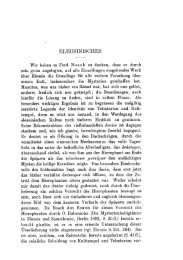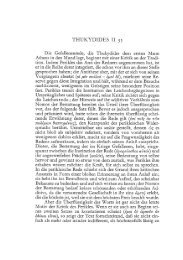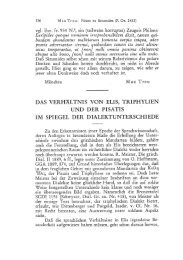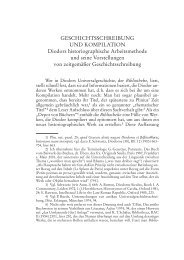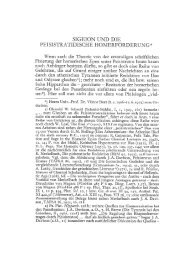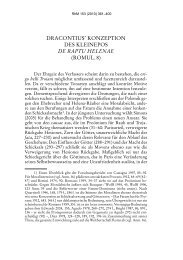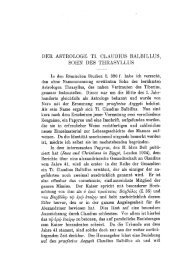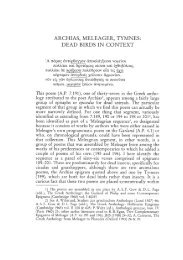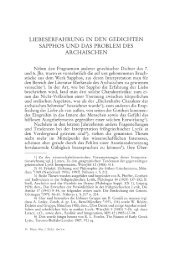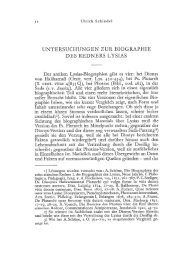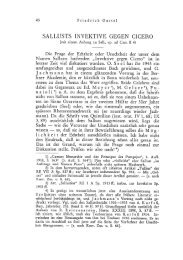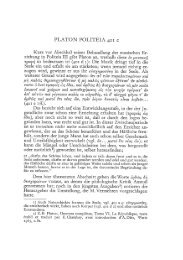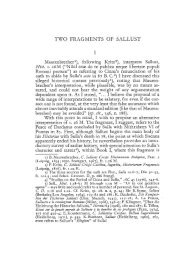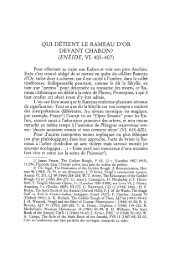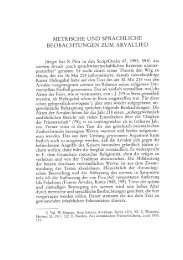PEPEDIIDIFFISSA NATE FICUS: PRIAPIC REVENGE IN HORACE ...
PEPEDIIDIFFISSA NATE FICUS: PRIAPIC REVENGE IN HORACE ...
PEPEDIIDIFFISSA NATE FICUS: PRIAPIC REVENGE IN HORACE ...
Create successful ePaper yourself
Turn your PDF publications into a flip-book with our unique Google optimized e-Paper software.
Pepedifdiffissa nate ficus: Priapic revenge in Horace, Satires 1.8 345<br />
eally penettated anus, and not neeessarily that which has been<br />
somehow punitive1y injured. Martial seemingly applies the word,<br />
literally meaning "fig orehard", at 12.33.2 to boys purehased by<br />
Labienus for anal sexual aetivity I7).<br />
We may thus with good reason eonclude that to a Roman<br />
audienee the wordficus would have had unmistakable associations<br />
with the anus, especially the anus deformed through penile<br />
penetration; Horaee's readers would have equally good grounds<br />
for eonneeting ficus with the anus slated for disfigurement in an<br />
aet of revenge by the phallie, and invariably menacing, god<br />
Priapus 18). Finally, other evidenee from "Priapie" eult would<br />
attest to a formal link between the god, particularly his phallus,<br />
and the vengefully and/or injuriously penetrated anus: the anuslike<br />
aperture ereated in the clenehed-first, "phallie", sign of the<br />
ficus, whieh is frequently represented on southem Italian amulets<br />
re1ated to Priapic worship, and whieh served to insult males I9 );<br />
the porttayal at Pettonius, Saryricon 138 of painful anal penetration<br />
with a fascinum as a ritual eure for impotenee vindietive1y<br />
17) Vt pueros emeret lAbienusvmdidit hortosf nil nisi fiettum nunc lAbienus<br />
habet.<br />
18) I accept the thesis of H.Herter, De Priapo. ReJigionsgeschichtliche<br />
Versuche und Vorarbeiten 23 (1932) 28 that Roman authors had begun to<br />
write "Priapean poetry" by the time of Catullus; indeed, I find Nonius<br />
Marcellus' statement (I H M) CatulJus Priapeo de meo Jigurrire libido est<br />
compelling evidence that Catullus himself tried his hand at such vorses.<br />
Although the extant collection of Priapea doubtless postdates Horace's<br />
Satires - as does our other, largely Priapean, testimony on the anal connotations<br />
officus, Horace must have had a Priapean poetic tradition on which<br />
to draw; his use of punning word play, a notable characteristic of Priapean<br />
poetry, in this satire (on which, see below, especially n. 21) mayaIso imply<br />
as much. I do not think, however, that the Latin word ficus itself - as opposed<br />
to marisca and the Greek word umeov (on which see Buchheit [above,<br />
n. 8] 201 ff.) - would have also connoted, to a Roman audience, the male<br />
or female genitals; neither the article s. v. ficus in the Thesaurus Linguae<br />
lAtinae, Vol. 6.1 (Leipzig 1912-1926) colls. 650-654, nor Buchheit provide<br />
any examples officus in such asense.<br />
19) See R.Payne Knight, An Account 0/ the Remains 0/ the Worship 0/<br />
Priapus, lately existing at Isernia, in the Kingdom 0/ Naplesf A Discourse on<br />
the Worship 0/ Priapus (London 1886) 4,28,148ff. (especially 149-151 "the<br />
thumb forming a phallus"). Payne Knight theorizes - on the basis of modern<br />
associations between the fig and a "woman's quaint", and the fact<br />
that woman wore these amulets as insurance against barrenness - that the<br />
aperture signified the vagina. Such an explanation does not, however,<br />
account for the use of the ficus-sign as an insulting gesture to males, as<br />
would the view that the aperture could symbolize both vagina and (male)<br />
anus, depending on the sex of the addressee.



